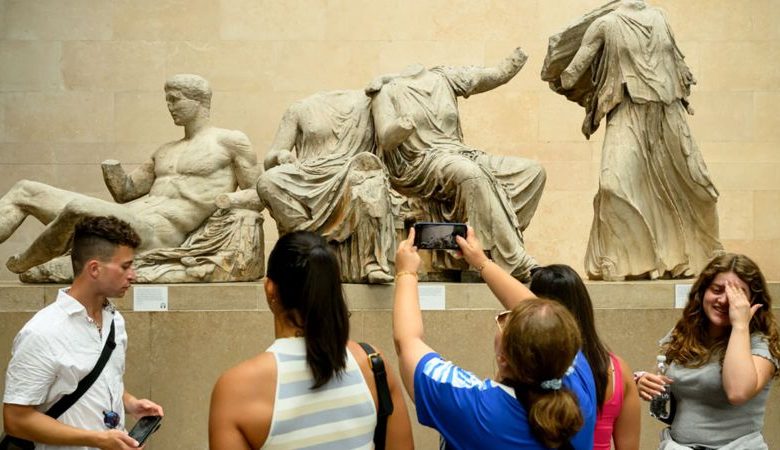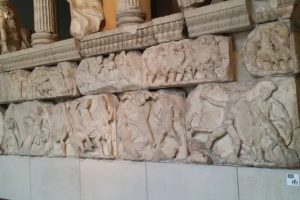Greece – British Epic Dispute on Parthenon Sculptures in the British Museum

Agencies – Sudan Events
In the early morning light on July 31, 1801, a ship-carpenter, five crew members, and twenty Athenian laborers “mounted the walls” of the Parthenon and, using ropes and pulleys, removed from the Parthenon edifice a sculptured marble block depicting a youth and a centaur in combat and lowered it to the ground. The next day the group lowered a second sculptured marble from the magnificent temple. During the next few years, the workmen stripped 15 of the 92 square-carved plaques of Pentelic marble (metopes) and 247 feet of the original 524 feet of frieze from the Parthenon high walls, as well as 17 pieces of sculpture from the pediment. In time, the entire collection was shipped to London. Except for the devastating Venetian bombing of the Parthenon in 1687, the removal of these sculptures from the Parthenon’s edifice was the single most violent desecration of classical Greece’s celebrated monument since its completion during the age of Pericles 2,200 years before.
A dispute between Britain and Greece over the ownership of the Parthenon Sculptures, known as the Elgin marbles, escalated on Tuesday, with both sides blaming the other for the cancellation of a planned meeting between their two leader
Prime Minister Rishi Sunak cancelled Tuesday’s meeting with his Greek counterpart Kyriakos Mitsotakis after his office said the two sides had previously agreed that it should not be used as a public platform “to relitigate long, long settled matters”.
“It’s simply the case that if assurances are given and they’re not adhered to, that there are consequences for that,” Sunak’s spokesman told reporters.
A senior Greek government official speaking on condition of anonymity dismissed the statement as “inaccurate”.
Greece has repeatedly called on the British Museum to permanently return the 2,500-year-old sculptures that British diplomat Lord Elgin removed from the Parthenon temple in 1806, during a period when Greece was under Ottoman Turkish rule.
About half of the 160-metre frieze that adorned the temple is in London, while another 50 metres are in the Acropolis museum in Athens, whose top floor layout mimics the Parthenon.
Appearing on the BBC over the weekend, Mitsotakis compared the separation of the carvings to cutting the Mona Lisa in half, a characterisation rejected by the British government.
“The PM did not say something new. Greece’s positions on the Parthenon sculptures issue are known,” said Aristotelia Peloni, an advisor to Mitsotakis on international policy. “Disagreeing on certain issues does not mean that we cannot talk.”
Both Britain and Greece said that the dispute jeopardised the opportunity to discuss global issues, including the wars in Gaza and Ukraine and the climate crisis. The two leaders would have also discussed a UK-Greece migration action plan.
Greek government spokesman Pavlos Marinakis said the cancellation was unprecedented and disrespectful but added that Athens did not want to let the row with Sunak spoil normally good relations between the countries.




